Music, Dance, and Traditions
Georgia is a country where rich traditions, ancient customs, and a vibrant cultural heritage continue to thrive. Its centuries-old music, dance, and rituals reflect Georgia’s complex history and diverse influences, blending elements from Europe, Asia, and the Middle East. Georgian culture is deeply tied to its sense of community, spirituality, and the natural landscape, creating an experience for visitors that is both unique and profound. Here’s a guide to exploring Georgia’s cultural heritage through its music, dance, and traditions.
1. Traditional Georgian Music
Georgian music, especially its polyphonic singing, is one of the most remarkable features of the country’s cultural identity. Recognized by UNESCO as part of the Intangible Cultural Heritage of Humanity, Georgia’s traditional music is characterized by rich harmonies and multi-voiced singing styles that have been passed down through generations.
Polyphonic Singing
- What Is It?
Georgian polyphony involves complex, multi-part harmonies with at least three voices interweaving distinct melodies. Each region of Georgia has its unique style, with differences in rhythm, melody, and tone. Some polyphonic songs are religious, while others celebrate love, nature, and daily life. - Famous Ensembles:
- Rustavi Ensemble: One of the most famous Georgian folk ensembles, known for preserving and performing polyphonic songs from all regions of Georgia.
- Basiani Ensemble: Another celebrated ensemble, often performing in churches and concert halls around the world.
- Where to Experience It:
Visitors can experience polyphonic singing in villages, churches, and cultural festivals across the country. In Tbilisi, many restaurants, especially those serving traditional cuisine, feature live performances of polyphonic singing. The Tbilisi International Polyphonic Festival also brings together choirs and singers from across Georgia and the world to celebrate this ancient tradition.
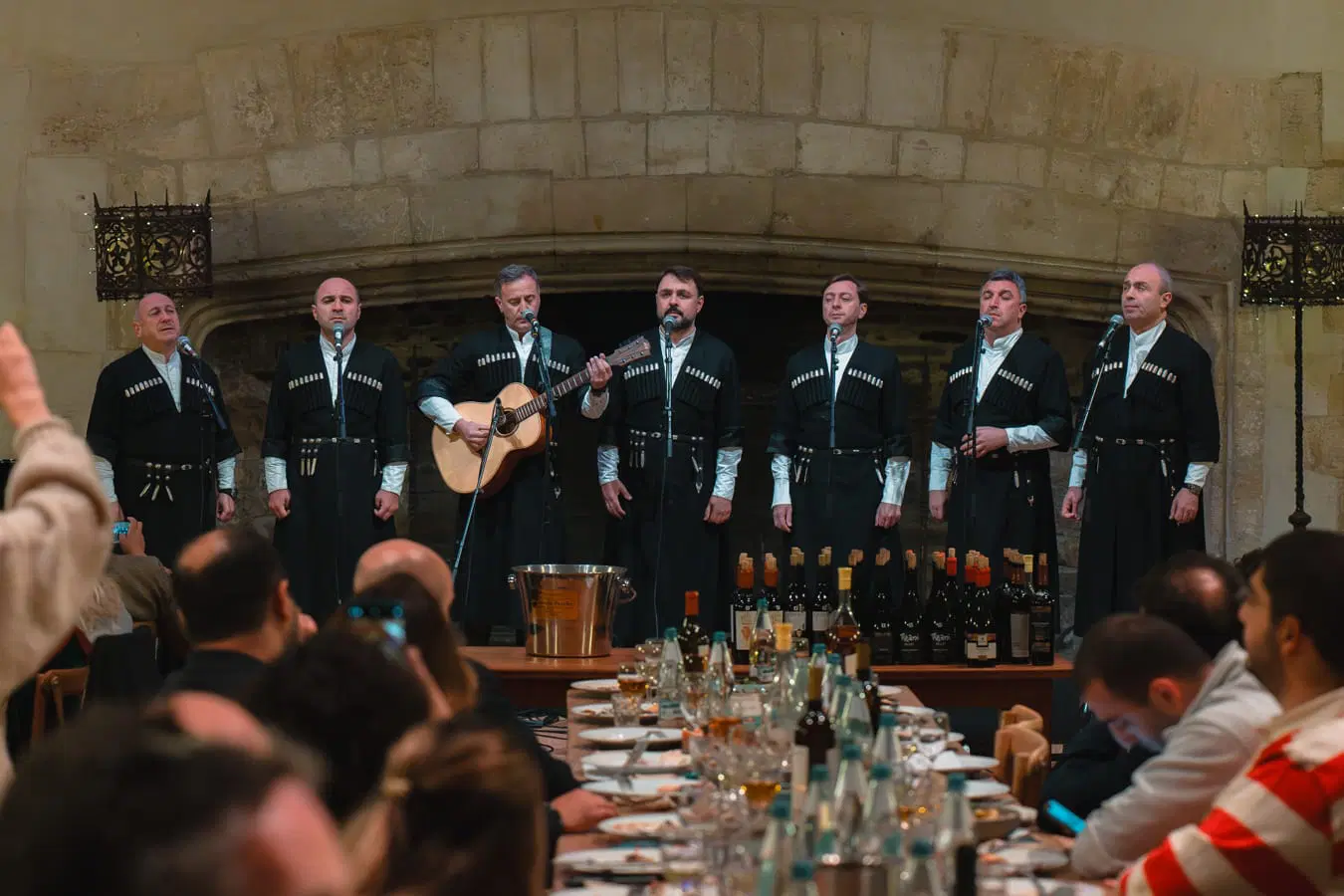
Choral and Religious Music
- Sacred Chanting: Georgian sacred chants (called hymnody) are performed in the country’s Orthodox churches. These chants are often polyphonic and are an essential part of Georgian religious life. Many of these chants were composed centuries ago and continue to be sung during religious services.
- Where to Hear It:
The best way to experience Georgian sacred chanting is to attend a church service at one of the country’s ancient monasteries, such as Svetitskhoveli Cathedral in Mtskheta or Gelati Monastery in Kutaisi.
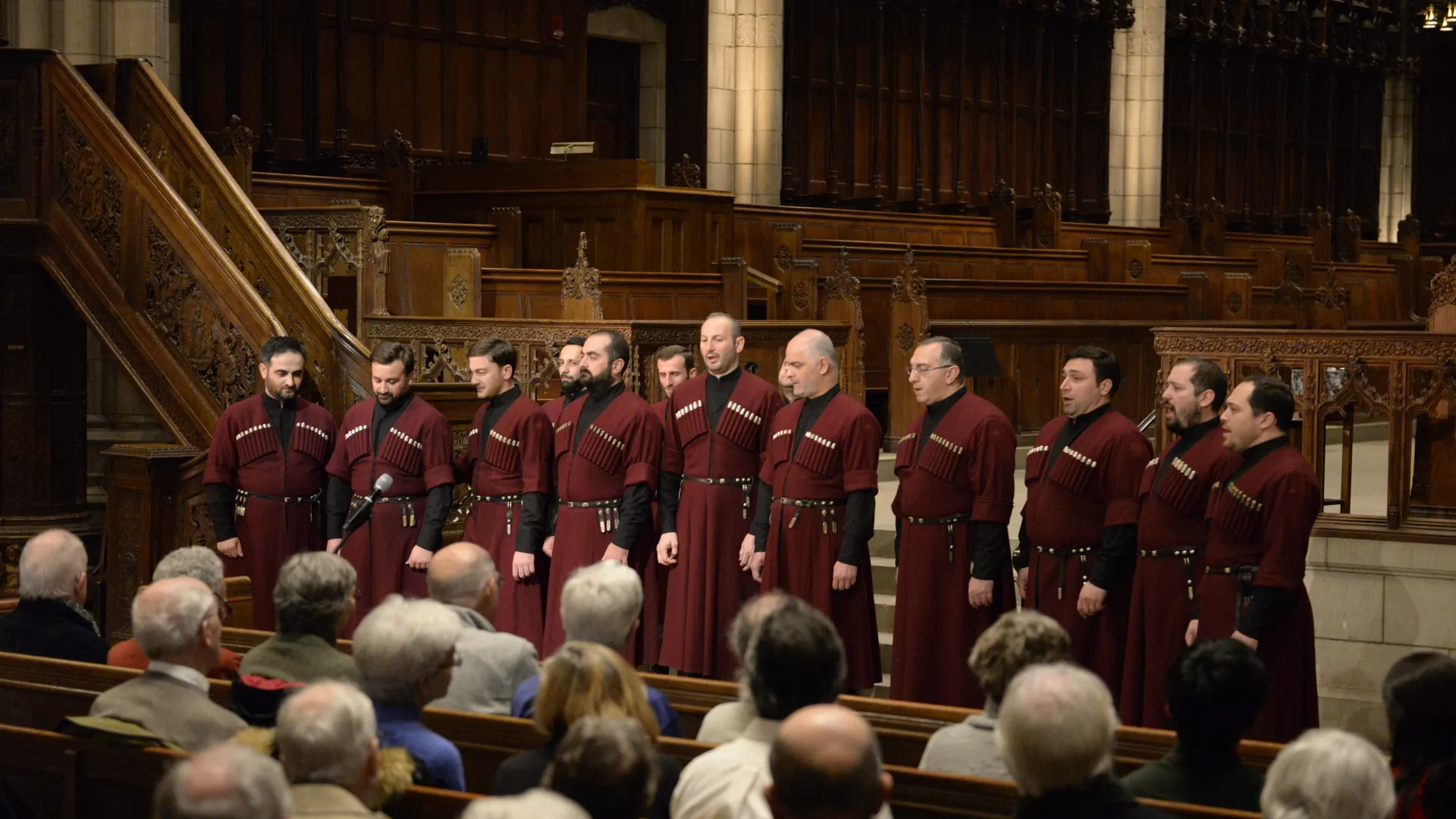
2. Georgian Traditional Dance
Georgian dance is an energetic and visually striking part of the country’s cultural heritage. Combining athleticism, grace, and intricate choreography, Georgian dances often tell stories of romance, history, and battle. Each region of Georgia has its distinct dance style, reflecting its culture and history.
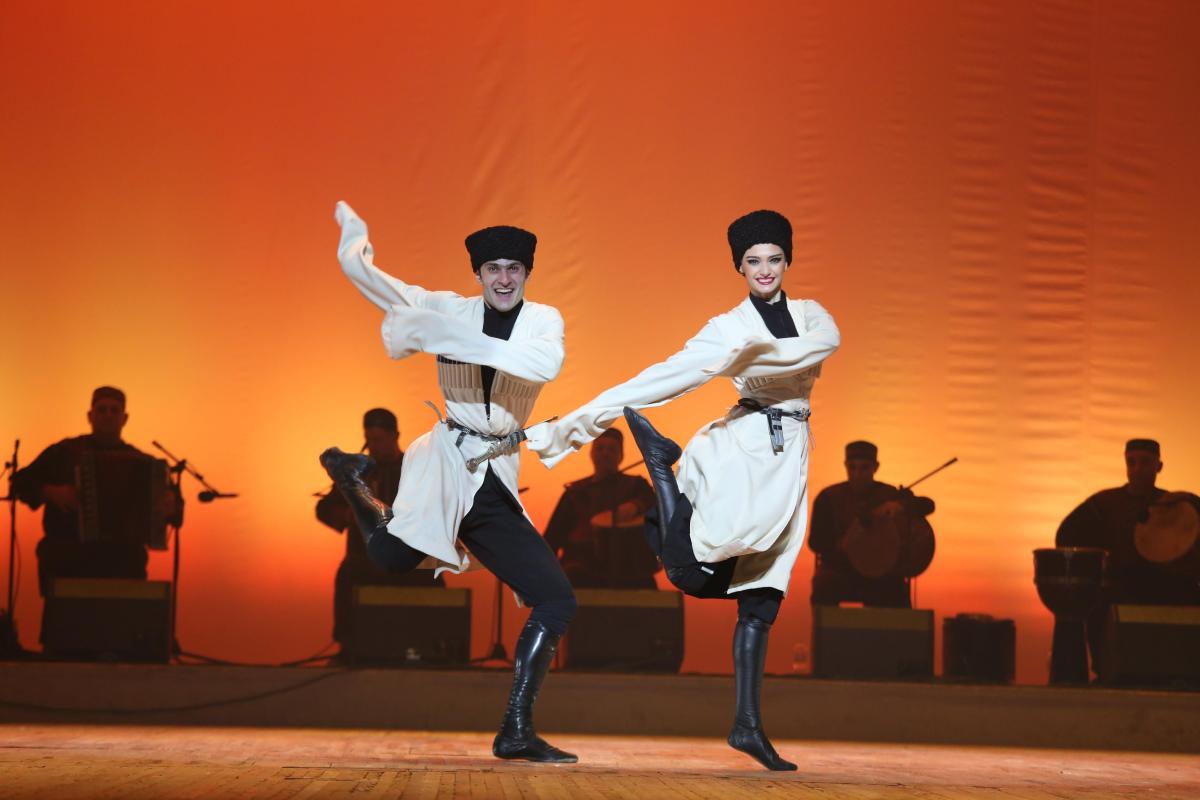
Famous Georgian Dances
- Kartuli (The Georgian Dance):
A romantic dance symbolizing respect and love is usually performed as a couple’s dance. The male dancer demonstrates elegance and control, while the female dancer embodies grace and beauty. Kartuli is often performed at weddings and celebrations. - Khevsuruli:
A dramatic, warlike dance that tells the story of a battle between Khevsur men, often featuring sword-fighting and acrobatic leaps. It is known for its intensity and displays of strength. - Acharuli:
A joyful, lighthearted dance from the Adjara region on the Black Sea coast, Acharuli is characterized by its playful movements and colorful costumes. It reflects the vibrant spirit of the region’s people. - Samaia:
A dance performed by three women, Samaia is believed to represent Queen Tamar of Georgia and celebrates femininity, wisdom, and power.
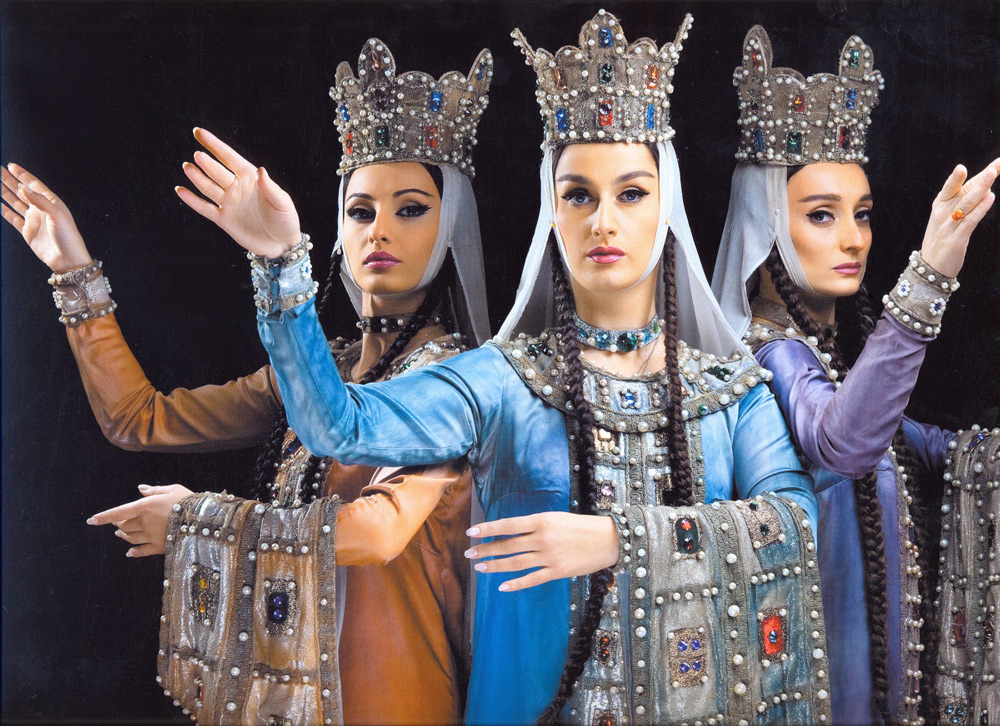
Where to Watch Georgian Dance
- Sukhishvili Georgian National Ballet:
Georgia’s most famous dance troupe, the Sukhishvili Ballet, has performed all over the world and is celebrated for its breathtaking performances of traditional Georgian dance. Visitors to Tbilisi can often catch one of their shows at the Tbilisi Opera and Ballet Theatre.
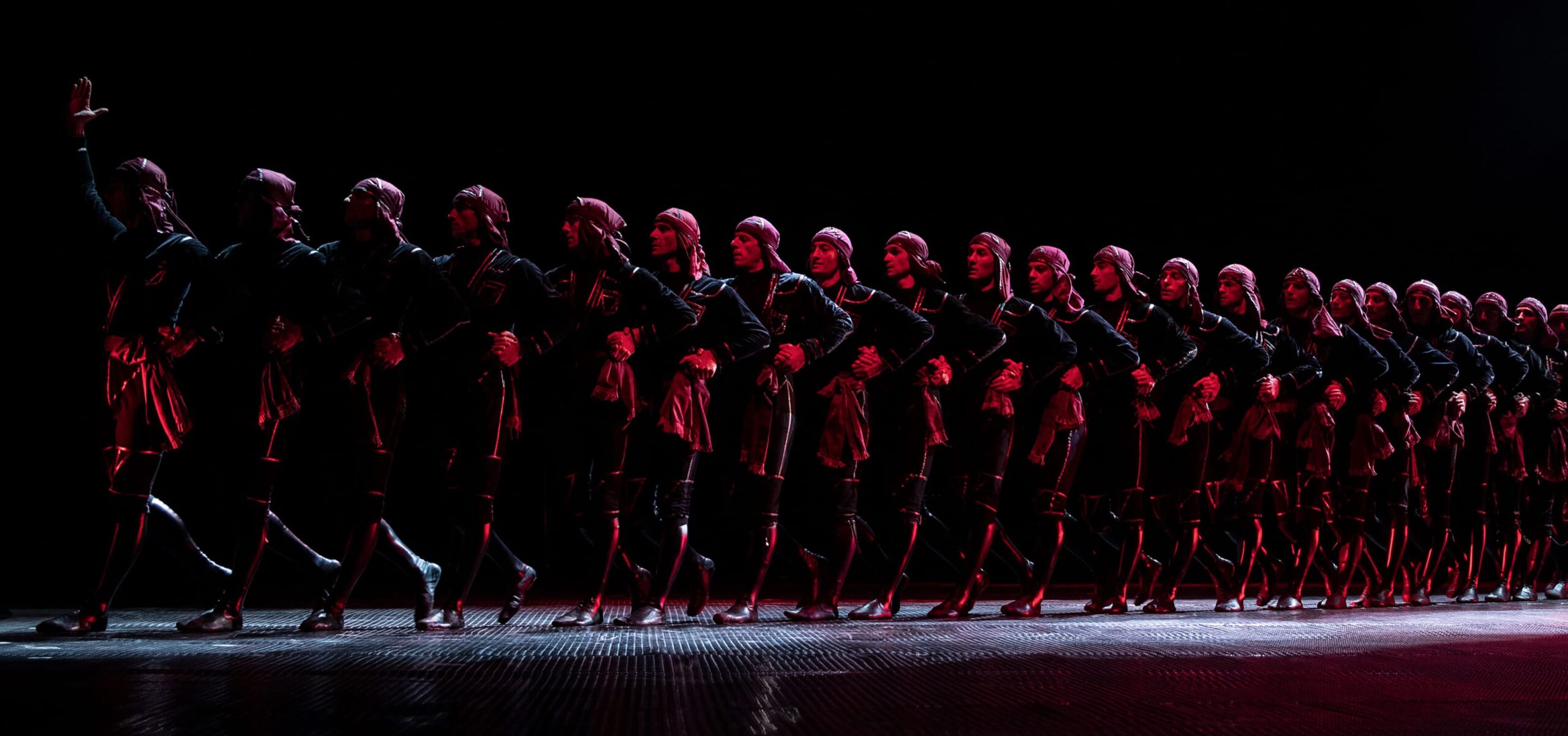
- Local Performances:
Traditional dance is commonly performed at supras (feasts), weddings, and cultural festivals. The Art-Gene Festival, held annually in Tbilisi, showcases traditional dance alongside music and crafts from different regions of Georgia.
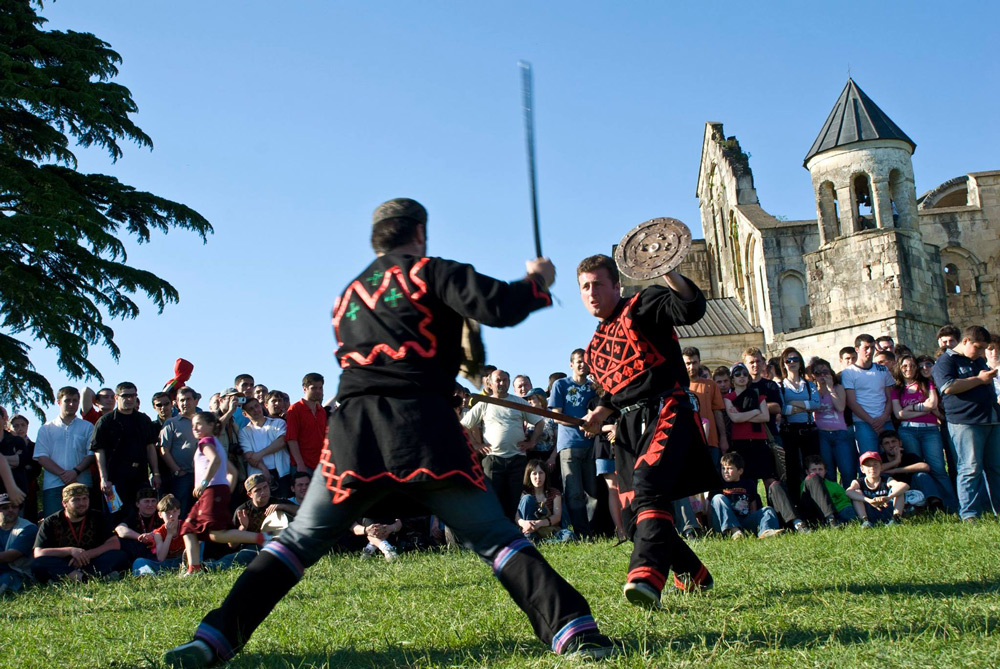
3. Georgian Festivals and Traditions
Georgia’s festivals and traditions are deeply rooted in its history and are often centered around family, religion, and food. These events offer visitors a chance to witness the country’s cultural vibrancy and participate in ancient customs.
Supras: The Georgian Feast
- What Is It?
The supra is a traditional Georgian feast, an essential part of the country’s culture. Supras are hosted for all kinds of celebrations, from weddings and birthdays to religious holidays. The feast is led by a tamada (toastmaster), who guides the proceedings with toasts, often philosophical or poetic.
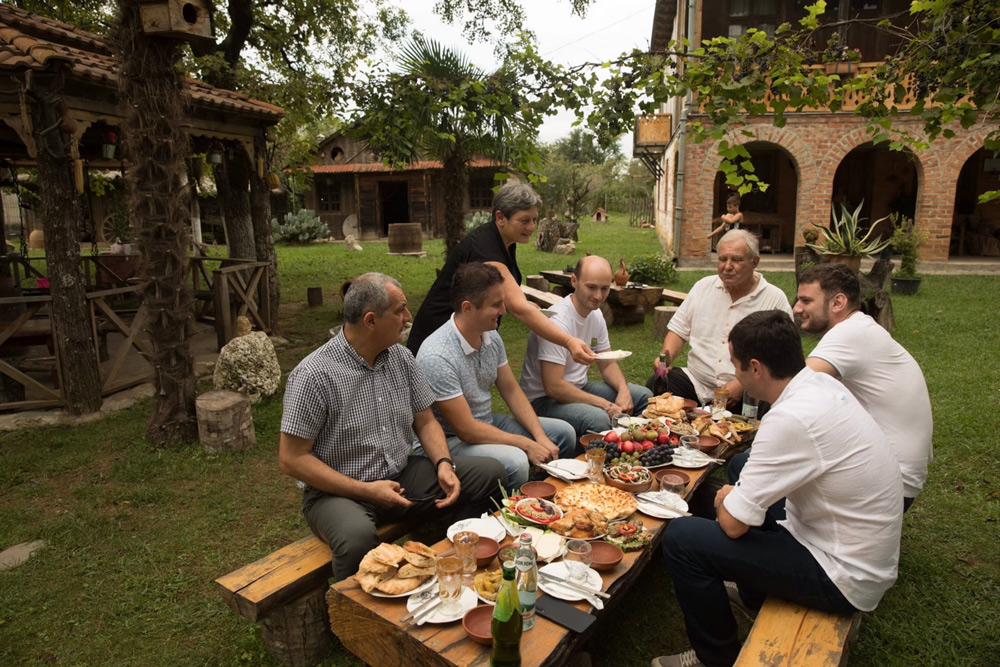
- What to Expect:
A supra is a lavish affair, featuring numerous courses of Georgian dishes such as khachapuri (cheese-filled bread), khinkali (dumplings), and mtsvadi (grilled meat). Wine flows freely, and polyphonic singing and dancing are often part of the celebration.

- Where to Experience It:
Many traditional Georgian restaurants in cities like Tbilisi, Kutaisi, and Batumi offer supra experiences for visitors. In rural areas, you may be invited to a family supra, which is considered a great honor.
Rtveli: The Wine Harvest Festival
- What Is It?
Rtveli is the traditional Georgian grape harvest, celebrated in the autumn months, particularly in the wine region of Kakheti. It is a time of celebration, as families and communities gather to harvest grapes, make wine, and celebrate with feasting and music. - Where to Experience It:
The Kakheti region is the best place to experience Rtveli, with many wineries and vineyards welcoming visitors to join the grape-picking and wine-making process. During Rtveli, locals host large feasts, and you can sample freshly pressed wine (known as takfiri or saperavi).
.jpeg)
Tbilisoba: Celebrating Tbilisi
- What Is It?
Tbilisoba is an annual festival held in October to celebrate the city of Tbilisi. It features street fairs, live music, traditional dance performances, and food stalls offering Georgian specialties. The festival highlights Tbilisi’s diverse culture, showcasing its unique blend of European and Asian influences. - Where to Experience It:
Tbilisoba takes place in the old parts of the city, particularly in Rike Park, Metekhi Bridge, and along the banks of the Mtkvari River. The festival includes craft fairs, grape stomping, and live performances by Georgian folk musicians and dancers.
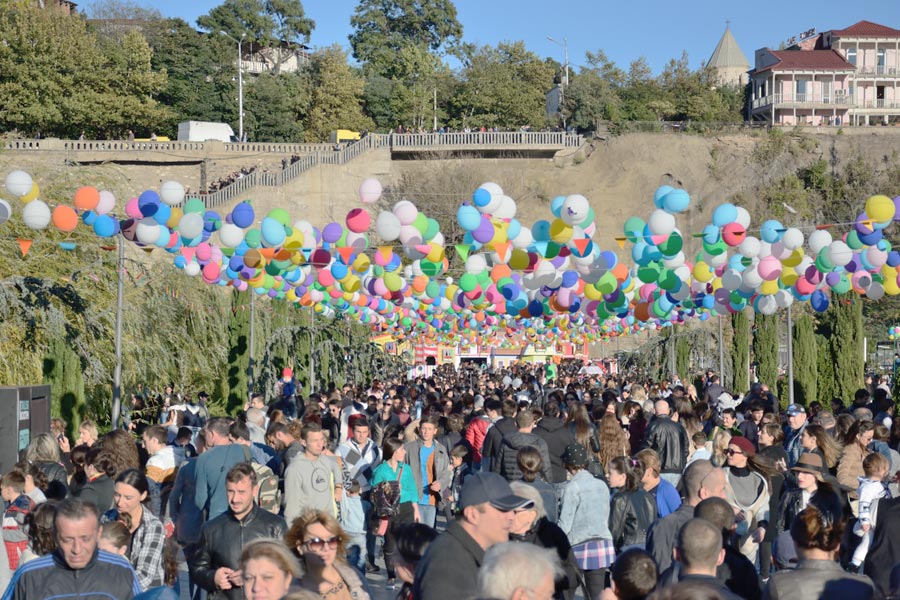
Easter and Alilo Procession
- What Is It?
Easter is one of the most important religious holidays in Georgia. The Alilo procession, held on January 7 (Orthodox Christmas), is a traditional event where people dressed in religious costumes walk through the streets, singing hymns and carrying icons and crosses. During Easter, Georgians gather for church services and traditional feasts, including the blessing of eggs and paska (sweet bread). - Where to Experience It:
The procession takes place in Tbilisi, Mtskheta, and other major cities. Churches across the country hold Easter services, and visitors are welcome to attend these deeply spiritual events.
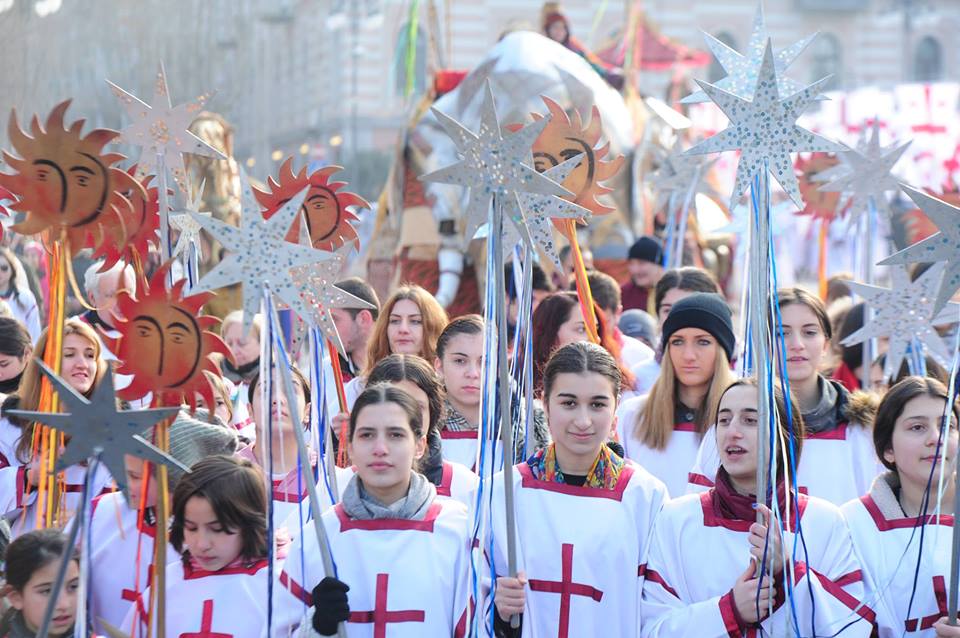
4. Georgian Wine Culture
Georgia is known as the cradle of wine, with an 8,000-year-old winemaking tradition. The qvevri method of winemaking, in which wine is fermented in clay vessels buried underground, is still practiced today.
- Wine Tasting: Visitors can experience Georgia’s ancient winemaking tradition by visiting wineries in the Kakheti region, where some of the world’s oldest grape varieties are grown. Participating in Rtveli (the wine harvest festival) is also a fantastic way to immerse yourself in the country’s wine culture.
- Wines to Try:
Be sure to sample Saperavi (a bold red wine) and Rkatsiteli (a dry white wine), as well as lesser-known varieties like Chkhaveri and Mtsvane.
.jpg)
Conclusion
Georgia’s cultural heritage is a captivating blend of music, dance, and age-old traditions, all of which reflect the country’s rich history and deep connection to its land and people. Whether you’re listening to the haunting melodies of polyphonic choirs, watching the powerful movements of Georgian dancers, or participating in a lively supra, you’ll find that Georgia’s cultural expressions are as diverse as they are beautiful. From the streets of Tbilisi to the remote villages of the Caucasus, exploring Georgia’s cultural traditions is a truly enriching experience.
